Is It Time To Invest In The Great Australian Dream?
COVID-19 has posed an incredible challenge to the Australian economy. However the response from government and the Reserve Bank of Australia has been unprecedented, in terms of its scale and speed. In the early months of COVID-19, the JobKeeper, JobSeeker and early release of superannuation schemes provided much needed support to the Australian economy. More recently, Federal and State Government attention has narrowed to specific sectors. The highly cyclical housing construction sector has been one of the largest recipients of fiscal stimulus in recent months, with initiatives to date including:
- The HomeBuilder Grant: $25,000 grants for owner-occupiers who build new homes or substantially renovate existing homes. The grants are limited in terms of recipient income ($125,000 for individuals and $200,000 for couples) and in terms of value (projects between $150,000 to $750,000 or new properties with values below $750,000). The grant is expected to cost $680m.
- Western Australian Government initiatives: a $125m package which provides an additional $20,000 for applicants who build new homes on vacant land or purchase new homes off the plan. The scheme is not means tested and has no property value cap. Western Australia’s 75% stamp duty rebate (capped at $25,000) has also been expanded to multi-tiered developments already in construction.
- Queensland Government initiatives: a $15,000 grant program for any first home buyer purchasing a new home valued at less than $750,000 and an additional $5,000 grant for buyers of an owner-occupied new home valued up to $750,000 in a regional location.
- Tasmanian Government initiatives: the existing $20,000 first home owners grant has been expanded to all Tasmanian owner-occupiers.
- Victorian Government initiatives: the Victorian Treasurer has indicated an intention to announce a housing stimulus package. He has said “to be frank, I think our efforts are going to be of a substantially larger quantum ”.
- New South Wales Government initiatives: the Planning System Acceleration Program announced to fast-track State Government project approvals. The program has included residential/housing projects.
- Social Housing: Social housing developments have been announced across multiple states.
- Stamp Duty: The New South Wales and Victorian Governments have shown interest in replacing stamp duty with a land tax, although it is currently unclear whether such a large reform will be achievable without Federal Government support.
All else equal, these initiatives are extremely positive for the housing market. But their impact needs to be considered in the context of other relevant variables such as:
- COVID-19 related macroeconomic shocks
- Monetary conditions
- Credit availability
- Housing affordability
- Immigration
- Lags between housing approvals, housing starts and housing completions
Given the interaction of the above factors, it is impossible to predict the short-term outlook for Australia’s housing construction market with precision. Nevertheless, this newsletter will consider how the Australian market has reacted following past major housing stimulus packages in order to review whether it can be concluded that these measures are likely to have a meaningful impact on construction activity.
1987: Reinstatement Of Negative Gearing
In July 1985, the Hawke Labor Government abolished negative gearing for all future rental property investors. In September 1987, soon after a federal election, this position was reversed and negative gearing was reinstated, as indicated by the red bar in the chart below. By November 1988, housing approvals were up 40% on the prior year. Housing approvals remained elevated for approximately two years, peaking at ~189,000 in May 1989, after bottoming at ~122,000 in 1987.
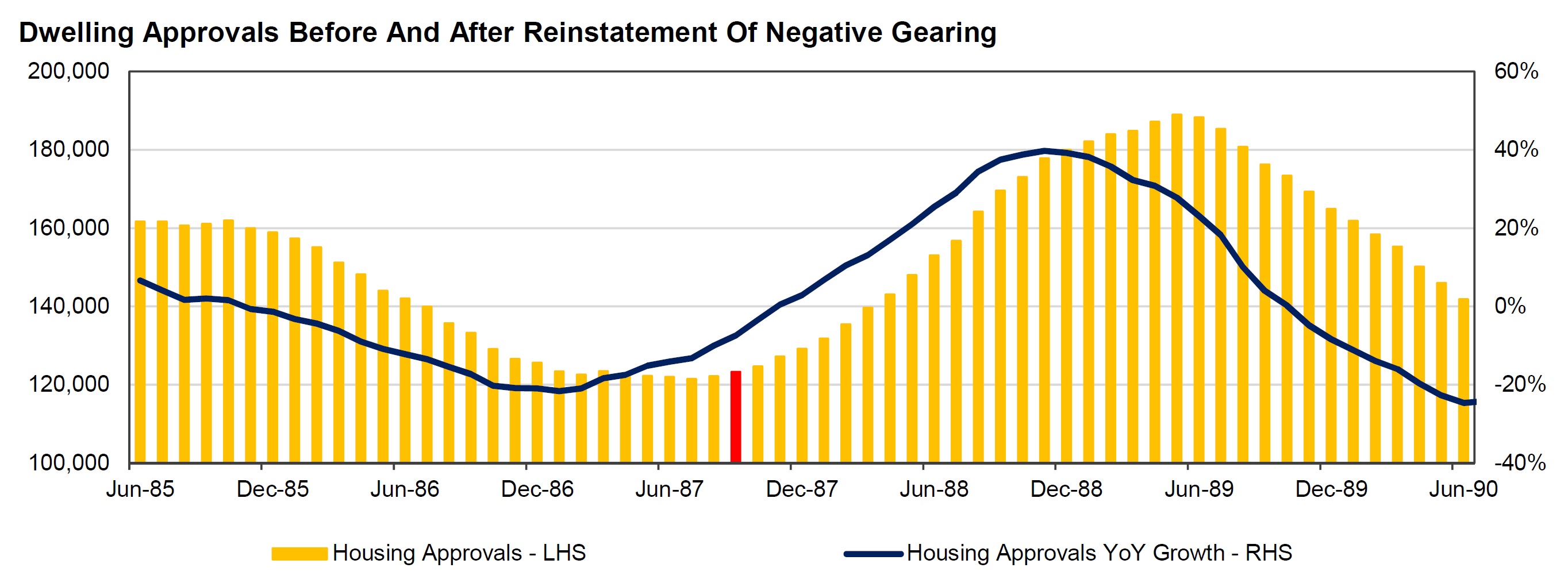
2000: Introduction Of First Home Owners Grant
In July 2000, the Howard Liberal Government introduced a $7,000 First Home Owners Grant to offset the effect of the GST on home ownership. This initiative was not enough to prevent a subsequent decline in housing approvals over the following year, before a sharp rebound in activity thereafter.
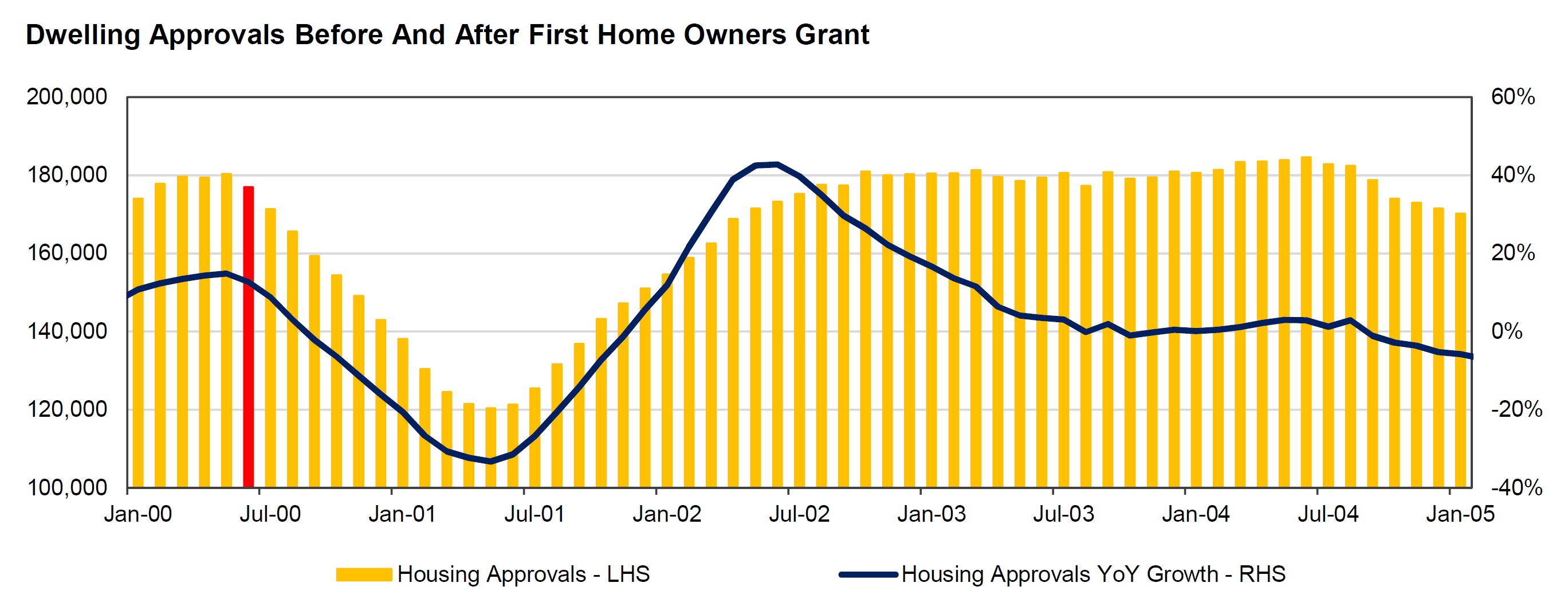
2008: Doubling Of First Home Owners Grant
In October 2008, the Rudd Labor Government expanded the First Home Owners Grant in response to the Global Financial Crisis. The First Home Owners Grant was doubled to $14,000 for established homes, and tripled to $21,000 for newly constructed homes. Housing approvals continued to decline until mid-2009, followed by strong growth as Australia emerged from the slowdown.
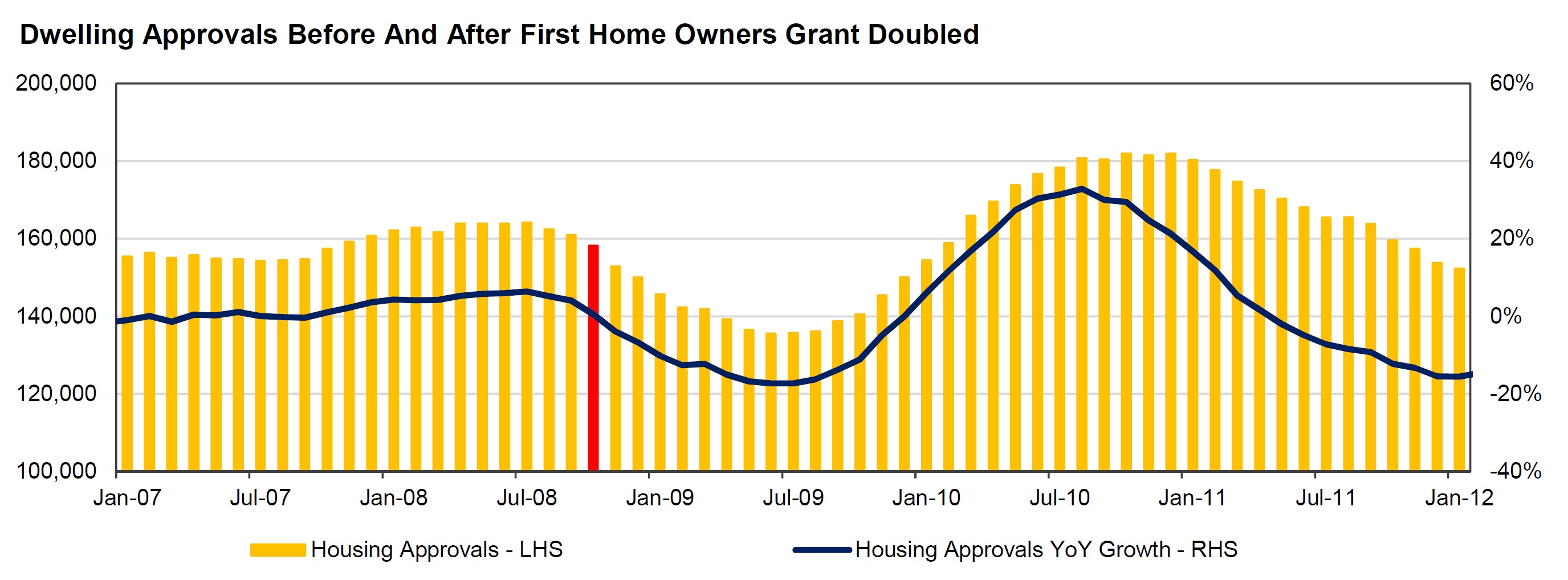
2012-2013: State-based First Home Owners Grants
In 2012-2013, various states introduced $7,000-15,000 First Home Owners Grants in response to housing affordability concerns. Queensland added a grant in August 2011 (tweaked in October 2012), New South Wales did so in October 2012, Victoria likewise in July 2013 and Western Australia followed in September 2013. As evidenced in the charts below, the introduction of the schemes was broadly accompanied by an increase in housing approvals in subsequent years.
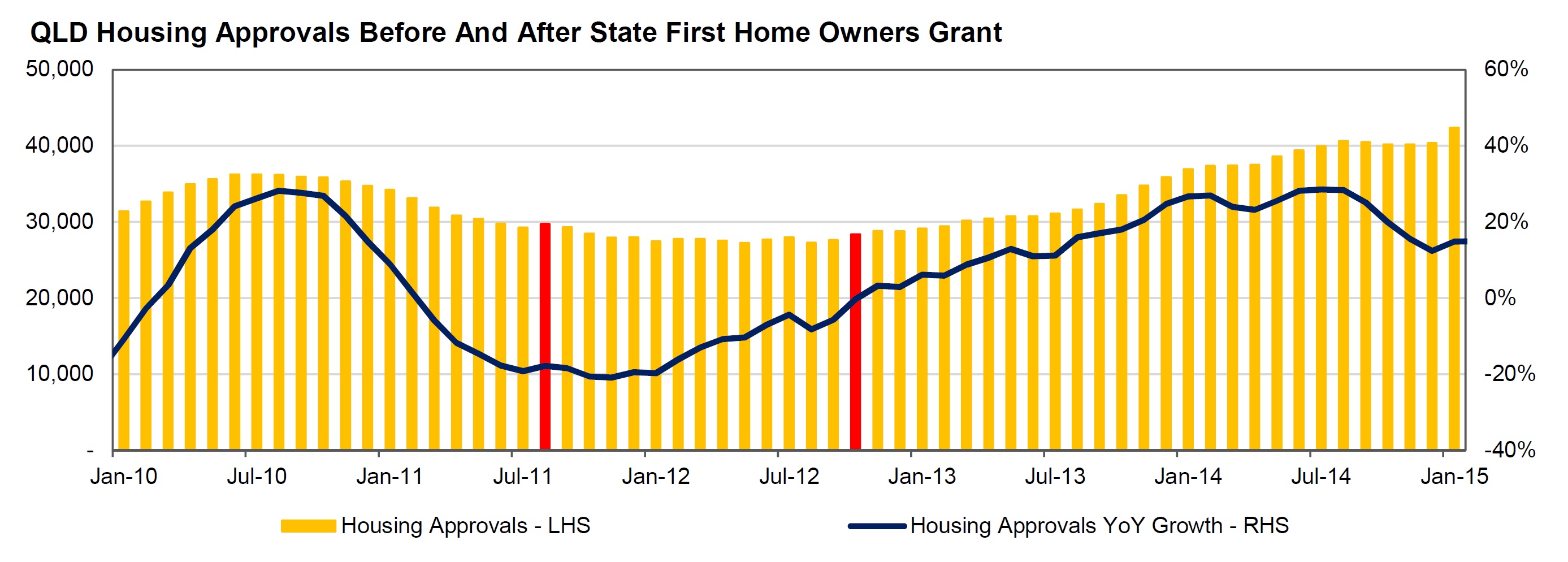
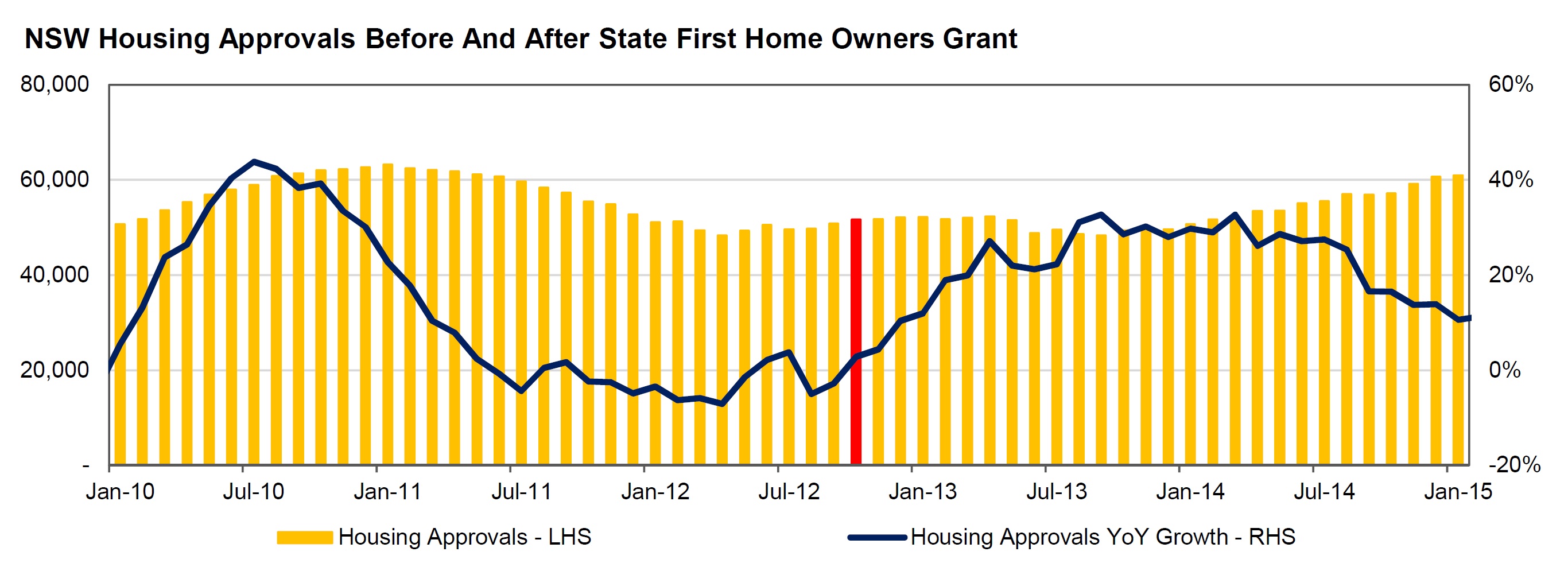
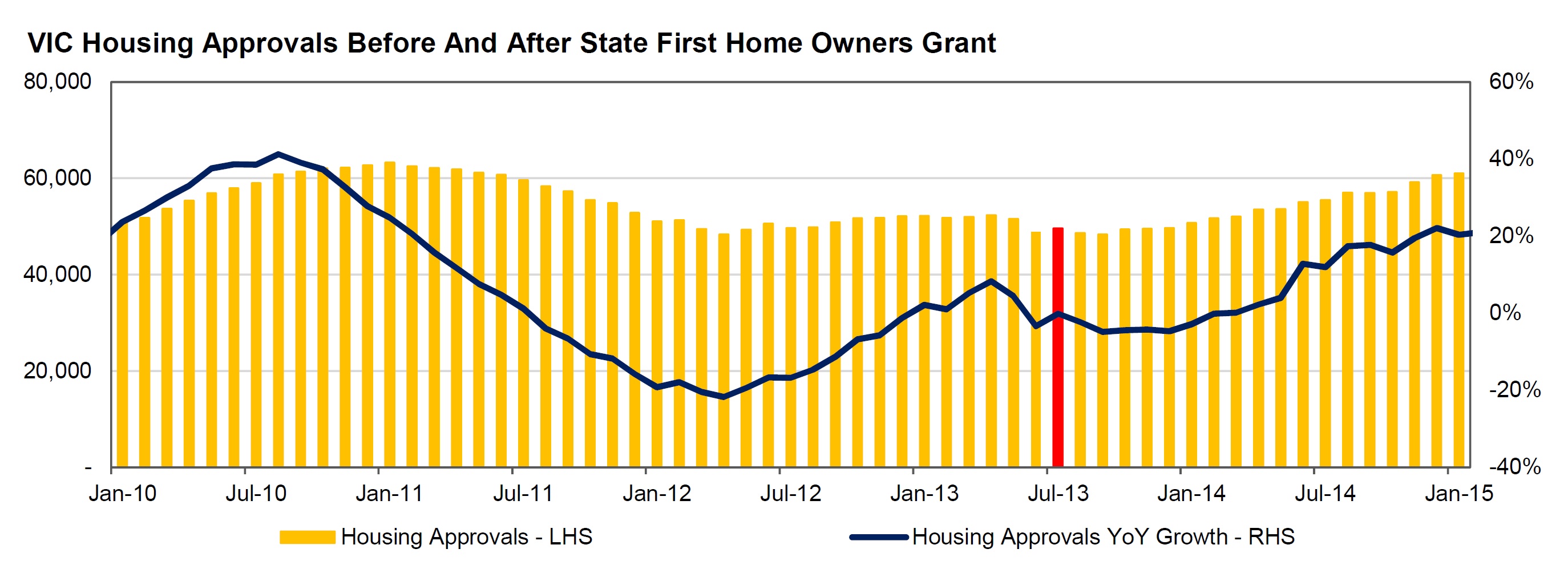
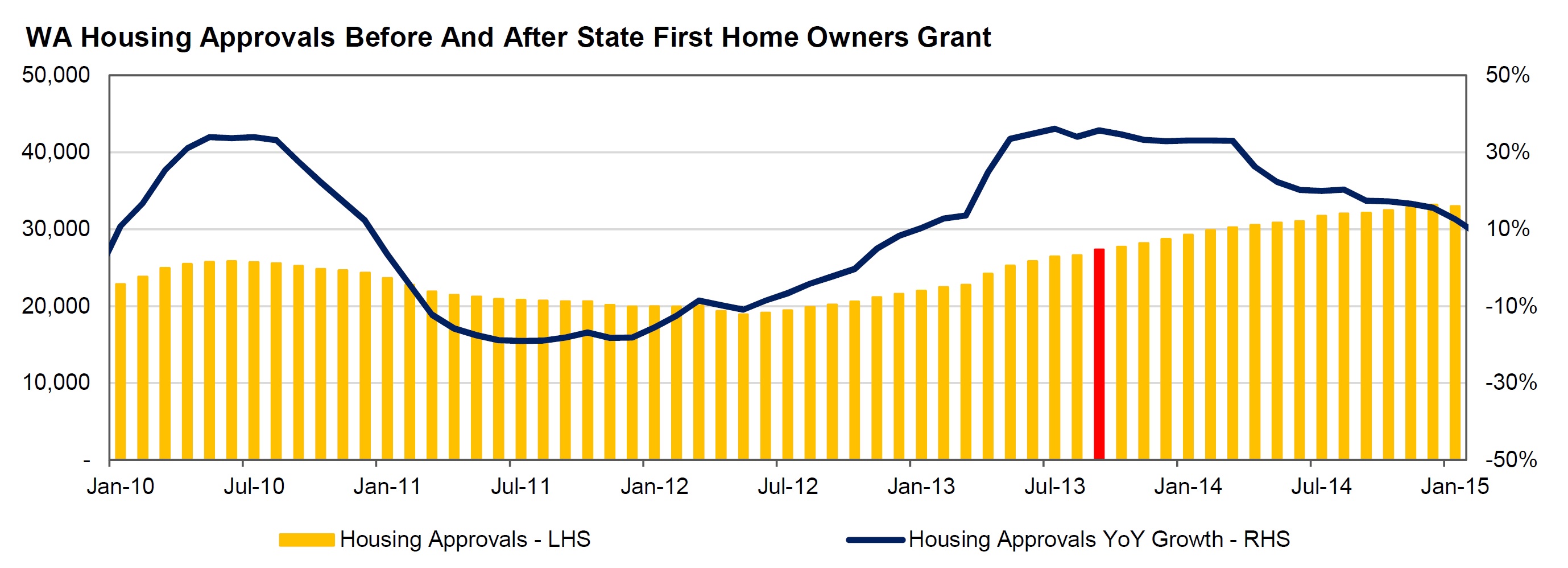
A look at past initiatives does not provide a comprehensive conclusion as to the likely effect of current stimulus. Each of the above stimulus packages was accompanied by its own set of unique circumstances. But it seems reasonable to conclude that housing stimulus has seen an improvement in housing approvals over the medium term. In the immediate future, the impact appears to depend on other factors already at play, which is not surprising given that each of these stimulus packages has been introduced in response to softening, or potential softening, in the economy or the housing market.
How can we apply these observations to the current housing construction market?
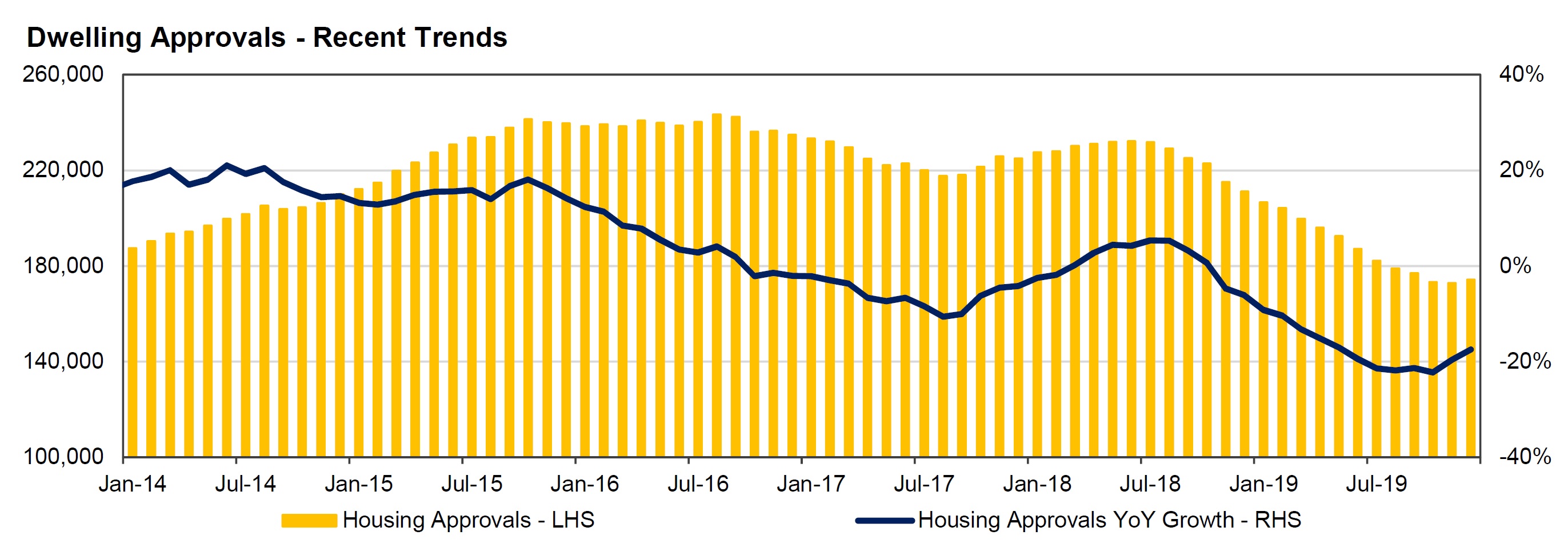
There are two reasons to be optimistic. First, the Australian housing market has been soft for a number of years and appeared to have been bottoming prior to COVID-19. Housing approvals are currently ~174,000, relative to a peak of 243,000 in 2016. This means Australia’s current housing approvals number is below Australia’s 1989 level, even though the population in 1989 was only 17 million compared to 25 million today. Secondly, the quantum and number of stimulus packages announced exceeds most historical precedents.
It might be reasonable to expect that the introduction of further government support is likely to drive an increase in housing construction activity over the medium term. Anecdotal evidence supports this proposition, with a number of property developers noting an immediate increase in new home sales following the recent announcements of housing stimulus. Whether this lift in sales is sustained and therefore leads to an increase in housing starts is to be seen. However, given many companies exposed to residential construction currently trade at heavily discounted valuations, we expect the sector to offer some compelling opportunities for long term investors.
Get investment insights from industry leaders
Liked this wire? Hit the follow button below to get notified every time I post a wire. Not a Livewire Member? Sign up for free today to get inside access to investment ideas and strategies from Australia’s leading investors.

